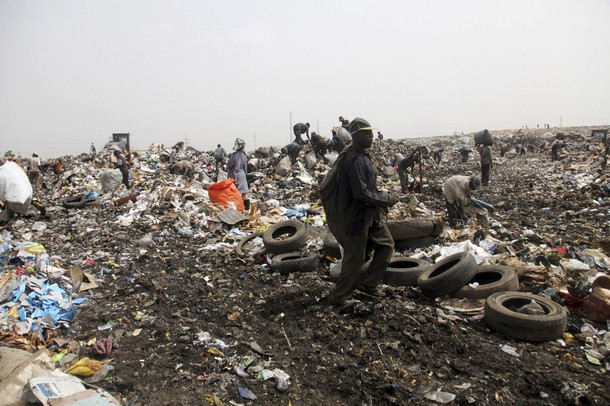Lagos govt to decommission major landfills in push for cleaner, flood-free city
The Lagos State Government says it will soon decommission major landfills that have outlived their usefulness as part of renewed efforts to improve waste management and promote environmental sustainability across the state.
The Commissioner for the Environment and Water Resources, Tokunbo Wahab, said this on Wednesday in a post on X (formerly Twitter) after a strategic meeting with all 57 local government and local council development areas’ chairpersons.
Mr Wahab said the initiative to stop the use of the landfill sites is part of the government’s broader plan to build a cleaner, flood-free Lagos through stronger coordination between state and local authorities.
“We are decommissioning landfills like Olusosun and Solous 3 that have outlived their usefulness, while ensuring that functional ones like Epe remain active and efficient,” the commissioner wrote.
For decades, Olusosun landfill, one of Africa’s largest dumpsites, has served as Lagos’ primary waste hub, spanning approximately 100 acres and receiving thousands of tonnes of refuse daily. Once located on the outskirts of Ojota, rapid urbanisation has now surrounded it with residential and commercial areas.
Environmental experts have long warned about the site’s health and safety hazards, including fires, toxic emissions, and groundwater contamination.
The government had earlier indicated plans to shut down Olusosun and Solous dumpsites for a waste-to-energy conversion project.
The meeting, held at the Ministry of the Environment and Water Resources, was also attended by the Commissioner for Transportation, Oluwaseun Osiyemi; Commissioner for Local Government, Chieftaincy Affairs and Rural Development, Bolaji Roberts; Secretary to the State Government, Bimbola Salu-Hundeyin; Special Adviser on the Environment, Olakunle Rotimi-Akodu; as well as Permanent Secretaries and heads of agencies.
According to Mr Wahab, discussions centred on strengthening collaboration with local councils to address flooding and environmental violations at the grassroots level.
“Our message was clear: environmental management begins at the grassroots,” he said. “We must all work together to build a cleaner, flood-free Lagos where waste becomes a resource rather than a burden.”
Lagos has been prone to flash floods, worsened by waste dumping and illegal construction that block drainage channels.
Lagos State Government recently blamed flash floods on waste and unapproved developments, reinforcing Wahab’s message that local enforcement is critical to flood prevention.
Mr Wahab stressed that each local government must take responsibility for effective waste collection, community sensitisation, and enforcement against indiscriminate dumping.
He also reminded the council chairmen that the ban on street trading remains in force, warning that environmental offences must be tackled decisively.
“The state is building resilient drainage and flood control infrastructure; our Local Governments must mirror this commitment in their own communities,” he said.
The commissioner emphasised that environmental sustainability is a shared responsibility requiring cooperation among all tiers of government.
“The State Government will continue to lead from the front, but true progress will come when all tiers of government work hand in hand,” Mr Wahab added.
The move aligns with Lagos’s broader shift toward a “waste-as-resource” model, in which refuse is processed into energy and recyclable materials.
The Lagos State Waste Management Authority (LAWMA) and the state government are already partnering with private firms to develop material-recovery facilities and waste-to-energy plants that could turn the city’s mounting waste challenge into an economic opportunity.

